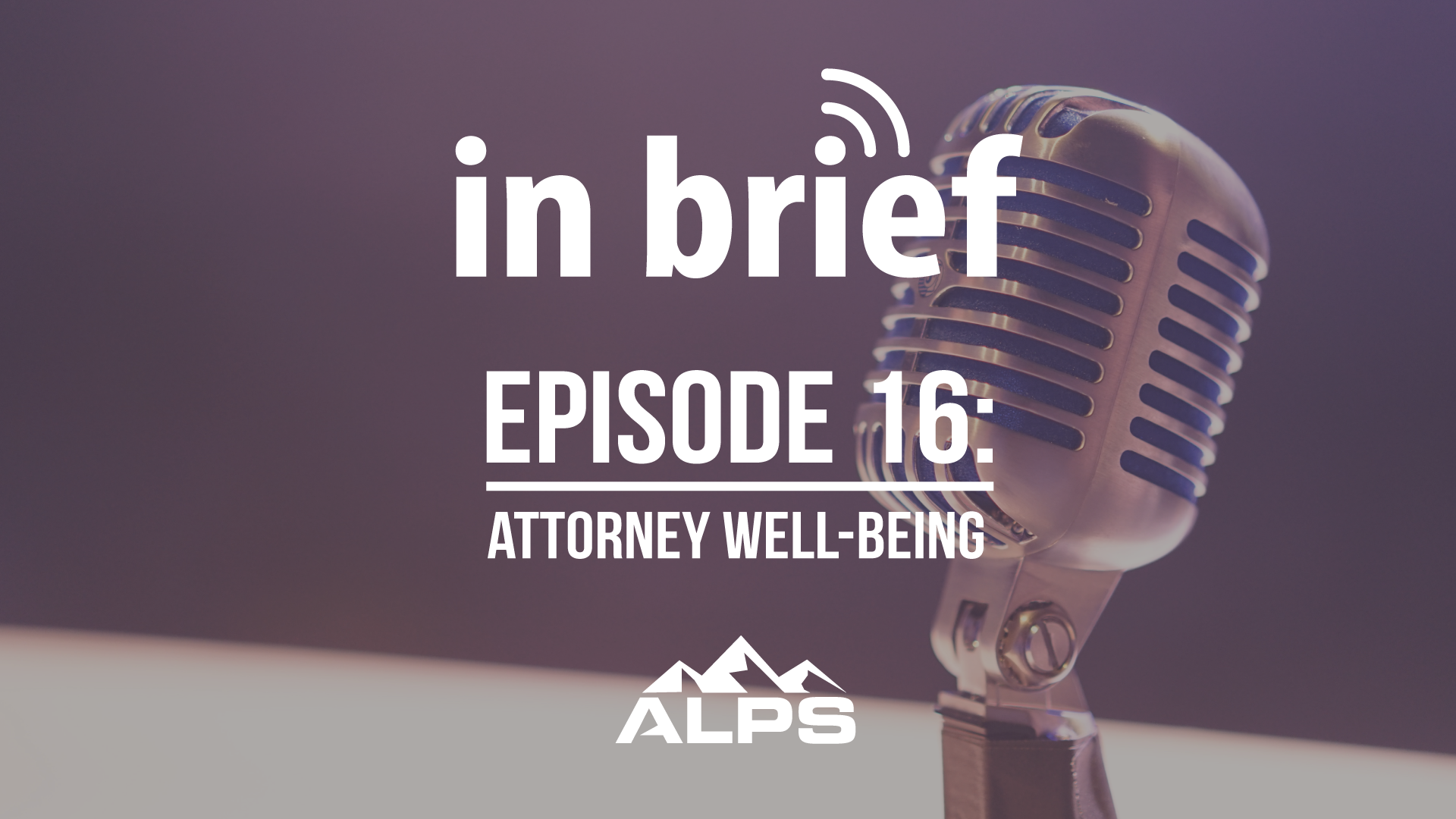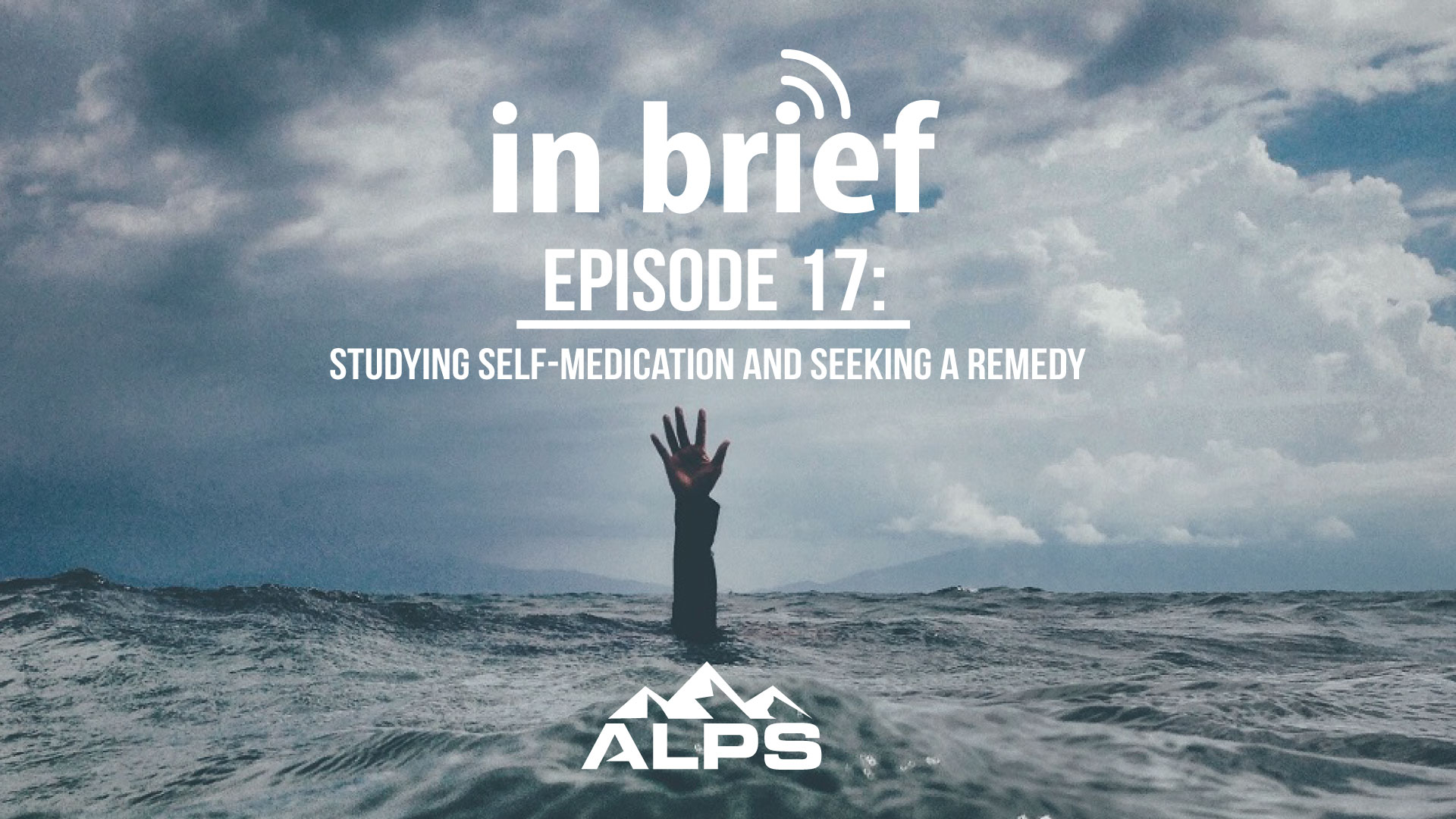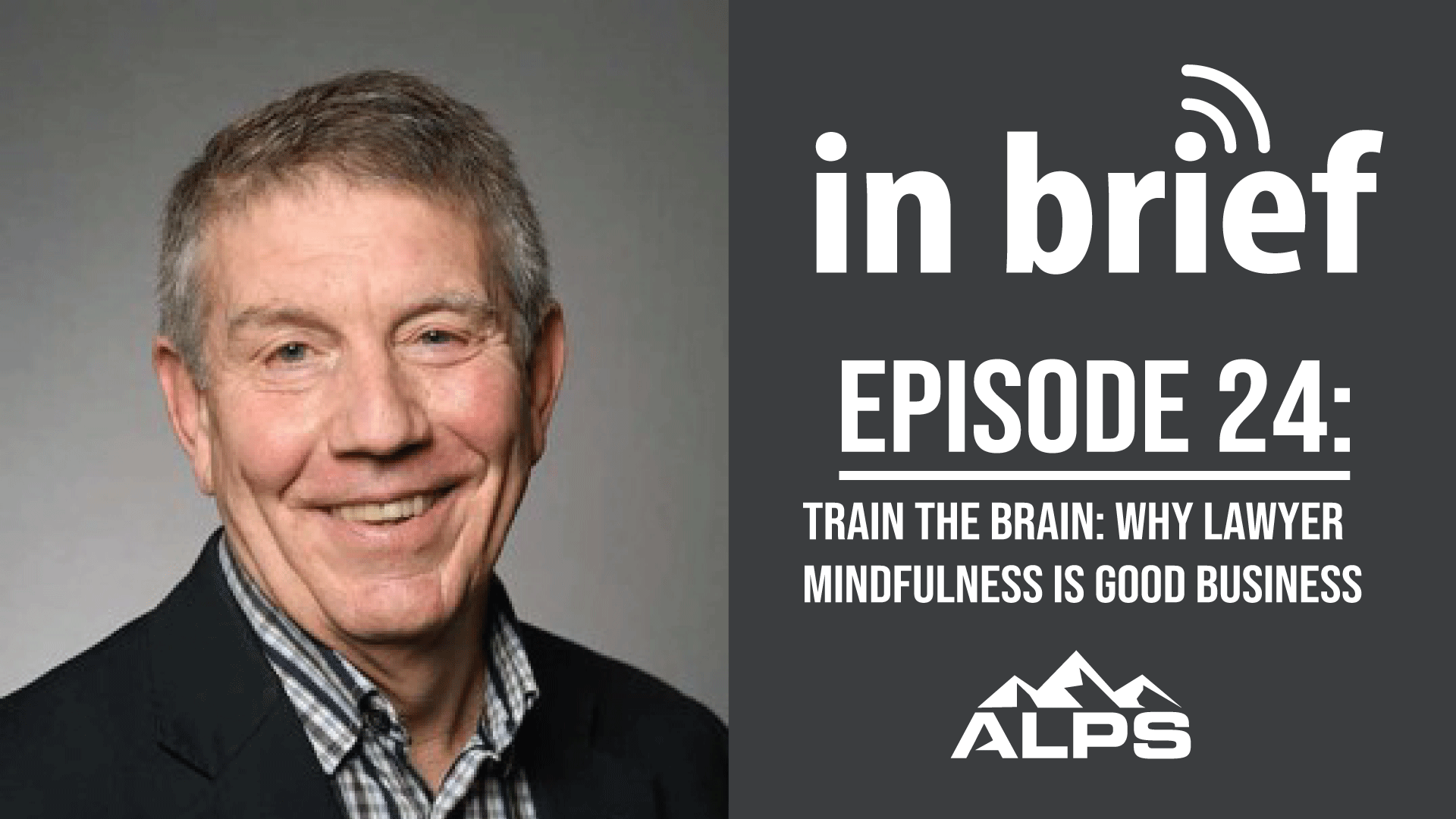14 min read
ALPS In Brief Podcast - Episode 17: Studying Self-Medication and Seeking a Remedy
Patrick R. Krill, JD, LLM shifted from the practice of law to addiction counseling at the Hazelden Betty Ford Foundation. In partnership with the...
We've crafted solutions tailored to your firm
The world of insurance for law firms can be confusing, and difficult to navigate. We've created this glossary because these common insurance terms should be easy to understand.
10 min read
 Mark Bassingthwaighte, Risk Manager
:
Updated on February 28, 2024 | Posted on June 14, 2018
Mark Bassingthwaighte, Risk Manager
:
Updated on February 28, 2024 | Posted on June 14, 2018

Mark Bassingthwaighte sat down with ALPS’ Executive Vice President Chris Newbold earlier this year to discuss the topic of Attorney well-being. They take a look at the challenges facing the profession and the steps being taken across the country to make improvements and provide resources. To learn more, visit the National Task Force on Lawyer Well-Being’s Resource Page, featuring the report and more information on what is happening in your state. This is the first episode in the Wellness Podcast Episodes.
ALPS In Brief, The ALPS Risk Management Podcast, is hosted by ALPS Risk Manager, Mark Bassingthwaighte.
Transcript
MARK:
Hello, this is Mark Bassingthwaighte. I’m the risk manager here at ALPS. Welcome to another episode of ALPS In Brief. We’re coming to you from the historic Florence building in beautiful, downtown, Missoula, Montana and I’m delighted to be able to introduce our guest this afternoon, Chris Newbold, the executive, vice-president of ALPS. We’re going to talk today about attorney well-being. Chris, before we begin with this topic, can you take just a few minutes and tell our audience a little bit about yourself?
CHRIS:
Yeah, Chris Newbold. As Mark said, executive, vice-president of ALPS, where I have really the benefit of playing a variety of different roles within the company. I’ve been with ALPS since 2002 and I work closely with Mark on making our lawyers better practitioners, as well as managing our bar relationships around the country. As many of you know, ALPS is endorsed by more states than any other and it’s a great opportunity to be able to understand the value of the organized Bar and we work with those Bars to aid them in best serving their members.
MARK:
Very good. We recently gave a presentation in Idaho on attorney well-being and you had a person al story that really struck me. Can you talk a little bit about your personal interest in this whole subject area of attorney well-being?
CHRIS:
Yeah, I had the great fortune of attending The University of Montana for my legal education and one of the great things about attending a smaller law school is the ability to be able to go to a school with a smaller class. I had a class of about 70 students or so in my first year. The interesting thing about how I’ve seen my class as they’ve sent through their professional development is I’ve unfortunately seen four of my classmates, in the 16, 17, 18 years or so since I’ve graduated, actually commit suicide. It’s an issue that’s hit home for me about just, where is our profession at? And what is it that drives folks to think about that turn of events? And what can we do about it as a profession that cares about its brethren? I’ve decided to lean in on the subject and get more active on a national level.
MARK:
What a wonderful thing to be doing. What we’re seeing around the country in terms of just Bar Associations and this whole topic is just becoming a very, very important issue to focus on. As we think about this practice, in terms of malpractice prevention, you know that kind of thing. How does ALPS view the whole issue of attorney well-being?
CHRIS:
Yeah, I think it’s a critical one that I think often time malpractice carriers don’t focus on enough. A lot of times we focus our time … A lot of your time, focusing on law practice management, technology trends, cyber security, but the interesting thing is that I think we all fundamentally agree with the principal that to be a good lawyer, one has to be a healthy lawyer. The reality is-
MARK:
Of course.
CHRIS:
The reality is, that in many of the claims that we see, we see issues associated with substance abuse, with mental health types of issues, depression, stress, that ultimately begins the ball rolling in terms of a lawyer’s life beginning to spin out of control. We see it, I think in our claims activity, that sometimes some of these issues really sit at the forefront of why a claim and an exposure to … a susceptibility to a claim, comes to the forefront. The more that we can be at the forefront of making lawyers better lawyers through being healthier lawyers, I think ultimately it makes … it makes good sense for us, but more so it makes good sense for the profession.
MARK:
Right, yeah, when I do a lot of lecturing on the topic, I often talk about this whole issue as being the real cause of malpractice. Carriers, we record, in terms of this statistical data. We talk about how many countering missteps were there. We talk about what the mistake was, but we really don’t track and record why the mistake happens and these are the issues. It is substance abuse. It is depression. It is Alzheimer’s and all kinds of things, so this health topic is very, very hot for malpractice prevention and just how I see it in legal circles.
You have become involved in the nation task force on attorney well-being. Can you talk to us about this came together? And how it ultimately wanted to measure its success. Just bring us up to date on what’s happening with the task force.
CHRIS:
Yeah, the task force was conceptualized and initiated by the ABA commission on lawyer assistance programs. The [inaudible 00:14:40] community if you will.
MARK:
Yes, okay.
CHRIS:
Also, the National Association of Bar Council and the Association of Professional Responsibility Lawyers and I think those groups were interesting to come together and say, “Wait, we may be facing a profession that simply is falling short when it comes to well-being.” I think that their intention was, it’s time to have a national conversation about where the legal profession is in terms of well-being and that collection of entities, that was both in and outside the ABA, was created in August of 2016. It has expanded to include the ABA Standing Committee on Professionalism, the ABA Center for Professional Responsibility, the National Association of Bar Council, the National Conference of Chief Justices, the National Conference of Bar Examiners, because when you really thin about well-being, it really spans the totality of stake holders in our legal community. It was from those groups that we brought these entities together and started to say, “What can we do? How should we think about lawyer well-being?”
I think from a measurement standpoint, it all became about, what can we do to increase the health of our profession and I think part of that was getting moving on bringing the stake holders together and thinking about, What is it that we can do to ignite a discussion about the subject that ideally transforms itself into a movement, that brings various stakeholders together to think about what each individual stakeholders’ role can be in terms of advancing the ball.
MARK:
Okay, yes. When I … I like, you’ve talked about how we’re bringing people together. We’re starting a conversation, but this group has gone well beyond just having a conversation. There really has been, if you will, a crowning achievement here in terms of a publication, The Path To Lawyer Well-Being; Practical Recommendations for Positive Change. Can you talk to us about what this report aimed to do and why is it gaining the traction that it is in such a short period of time?
CHRIS:
The report was, again most of the folks who are associated with the National Task Force are volunteers, so to ignite a movement if you will, we feel like we needed to put together a definitive report on the … How do we create a movement to improve well-being in the profession? We basically set out to lay out a blue print, if you will, and to say, what is the issue? How do we define well-being? How do think about what other reasons are to take action? What are the calls to action that different stakeholders can take? And then to offer concrete, definitive steps that were really authored and peer-reviewed by individual stake holders groups to be able to then lay forward a, if you want to take action on this particular issue here are some things that you can think about.
If you get a chance to take a look at the report, widely available obviously on the internet, it really does lay out a host of 50, 60 recommendations if you will on how we can improve on the well-being front. It really brings in the totality of stakeholders that can play a role in the particular fight. That could be from the judiciary to the regulators to the Bar Associations to the law schools to the lawyer assistance programs, even to the professional liability carriers. It was really that kind of semblance of how do we bring all of the different groups together to put together a definitive report that ideally would ignite a national discussion. Which, we’re really pleased that we think that it has, although just when we think that we’ve ignited a movement if you will, some people are just hearing about it for the first time, so we’ve got a long way to go in terms of where we want to get to. We think that the first step in terms of authoring this report, was a great first step on behalf of the National Task Force.
MARK:
Oh, absolutely. I couldn’t agree more. We’re talking here about the health of the legal profession. Can you share some thoughts on just the overall benefits of lawyer well-being?
CHRIS:
Yeah, I really think it breaks down into three reasons. One, it’s good for business. When you think about lawyer health, it’s an important form of what I would call human capital, in terms of providing a competitive advantage in the law firm environment. The more that job satisfaction predicts retention and performance, when you can cultivate a culture that ultimately is embracing of well-being, you lower turn-over, you heighten client satisfaction, you heighten productivity and ultimately for law firms, you heighten on profitability. For me, the first stop is, I think, it makes sense from a good for business perspective.
Secondly, I think it’s good for our clients. You work in the business of ethics and professionalism and when you think about rule 1.1-
MARK:
Right.
CHRIS:
That requires lawyers to provide competent representation and when we think about a lawyer’s duty of competence, we all operate better when we operate from a position of strength and health than we are from one of deficiency or depression or stress. When you look at it just from the indispensable part of a lawyer’s duty of competence, well-being makes sense, right?
MARK:
Right.
CHRIS:
And then I think the third element is just this notion of, it just is the right thing to do from a humanitarian perspective. From thinking about how we work with our fellow lawyers. We knew to do more to just do the right thing. I think sometimes there’s a stigma attached for thinking about what’s in the best interest of others. We feel like well-being, it’s good for business. It’s good for clients. It’s the right thing to do.
MARK:
You know and I … This is interesting. I’ve shared, you know, I do a lot of lecturing as you well know on this whole topic of attorney well-being, but coming at it from a risk management, malpractice perspective. So much of my focus is really on addressing, we need to learn to recognize, address substance abuse, mental health. Try to teach steps that we can take to move forward and get help where help is needed, but I’m sensing here, that what you and the task force is focusing on is a broader conversation. Where looking at well-being as something more than just addressing the substance abuse issue, the mental health issue. Is that correct?
CHRIS:
I think that’s exactly right and that’s not to diminish the real challenges associated with substance abuse, depression, stress, mental health types of issues. It’s really, for me, it’s thinking about, where are lawyers at in terms of satisfaction? In terms of life satisfaction? One of the things I really enjoyed, you know some of the kind of social science elements of the report, was really defining lawyer well-being and thinking about it as a continuous process in which lawyers strive in each dimension of their life. Whether that’s the emotional dimension of their life and recognizing the ability to identify and manage one’s emotions to support mental health. Whether you’re thinking about the occupational well-being and how much satisfaction and growth and enrichment are you getting from your work life? The intellectual component of well being and continuously learning and challenging one’s self in terms of ongoing development. The spiritual element of well-being. How are we doing with respect to a sense of meaningfulness and purposefulness in all aspects of our life? Obviously, the physical one.
We just turned … A lot of New Year’s Resolutions going on right now. The notion of regular physical activity, eating well, sleeping well and then the social element of well being. Are we developing a sense of connection, belonging and support networks? When you think about well-being, not just from the substance abuse side, but from the emotional, the occupational, the intellectual, the physical and the social side, there’s really a wide-ranging compendium of elements that I think ultimately drive into the well-being equation.
MARK:
Yes, yeah. Okay. Very good. How would you assess where this whole well-being movement is today and do you have any thoughts on where it’s going to go? Particularly in light of what the task force has done here?
CHRIS:
I think that we’re in a very interesting position. Someone recently mentioned to me that this is the right discussion point at the right time for the profession and I happen to agree with that. I mean, I think that the report itself was a call to action. I think the stakeholders have been identified and what role people can play. I think there’s a lot of work that we can do in ending some of the stigma surrounding help seeking behaviors that sometimes effect lawyers. I mean we’re obviously, we talked a little bit about emphasizing that well-being is an indispensable part of a lawyer’s duty of competence. I think we’re at a time where it’s much more socially acceptable to begin to kind of talk about these issues more openly, which begins with educational outreach and programming on well-being types of issues.
I think we’re changing the tone of the profession, one small step at a time. What I’m enlightened by is the notion that there’s a growing sentiment from the national, from the report, that’s stimulating conversation at the local and the state level. We’re seeing a variety of different state commissions and task forces come in to play, that’s assessing, how are things going in local law schools? How are things going in local firms? How’s the regulatory community thinking about this? How does this affect our CLE requirements? I just think there’s a lot of interesting conversations going on right now that ultimately is going to lead to the type of action that we anticipated in the drafting of the report.
MARK:
I agree with you and I certainly hope so. The one thing that impressed me is the broad coverage of the analysis and of the ideas coming out of this report. For you listeners, I certainly encourage you at some point, to take a look at this report, the publication. It is quite a fascinating read. Chris, it’s been a pleasure. Before we wrap up, do you have any concluding comments, remarks you’d like to share?
CHRIS:
I would just conclude by again, the premise here, which is that good lawyers are defined by healthy behavior. I think as a profession we need to be thinking about how law students are thinking about the profession, the demands that we’re placing on our associate lawyers. There’s a lot of kind of interesting elements that are coming to fruition here in this discussion and I remain optimistic, that while I think we have some challenges, I think we also have some of the most intelligent and thoughtful folks in our profession. The more that we can work together, collaboratively, I think that’s there’s definitely a yearning and an ability for us to improve the health of our profession and that’s ultimately the goal.
MARK:
Sort of one of my take aways with this whole conversation is, you’re reminding us to think about why we do what we do. In essence, we don’t live to work. We really should work to have a life and to live and to enjoy. It just, to me it helps me start to think about priorities again. What’s important.
Listen Chris, it really has been such a pleasure. I do appreciate you taking the time to visit with our listeners here on the In Brief podcast. Hopefully at some point in the future, we can get together again and explore other topics, perhaps even follow-up on this. To those of you listening, thanks for taking the time and please feel free, if any of you have any thoughts, ideas on other topics or items you’d like to hear discussed in future podcasts, please don’t hesitate to reach out. You can find me at mbass@alpsnet.com
That’s it. Thanks for living. I’m sorry. Thanks for listening. Have a good one. Bye-bye.
ALPS In Brief Podcast Intro/Outro Music: Walk In The Park by Audionautix is licensed under a Creative Commons Attribution 4.0 license. https://creativecommons.org/licenses/by/4.0/
Artist: http://audionautix.com/
Since 1998, Mark Bassingthwaighte, Esq. has been a Risk Manager with ALPS, an attorney’s professional liability insurance carrier. In his tenure with the company, Mr. Bassingthwaighte has conducted over 1200 law firm risk management assessment visits, presented over 600 continuing legal education seminars throughout the United States, and written extensively on risk management, ethics, and technology. Mr. Bassingthwaighte is a member of the State Bar of Montana as well as the American Bar Association where he currently sits on the ABA Center for Professional Responsibility’s Conference Planning Committee. He received his J.D. from Drake University Law School.

14 min read
Patrick R. Krill, JD, LLM shifted from the practice of law to addiction counseling at the Hazelden Betty Ford Foundation. In partnership with the...

10 min read
Jeff Bunn, lawyer, wellness expert and owner of the Mindful Law Coaching and Consulting Group, presents the business case for investing in attorney...

15 min read
How can we make real changes within the practice of law to lessen the impact of stress on individuals in this profession? In this episode of the...